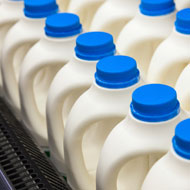Dairy Crest announce September price cut

Dairy Crest is set to reduce its milk prices to 21.69ppl for farmers supplying milk on a standard liquid contract.
Milk processor Dairy Crest has announced a significant drop in its September milk prices, blaming challenging market conditions as the reason for the fall.
From 1 September, the company will reduce its milk prices by 1.4 pence per litter to 21.69ppl for farmers supplying all or a proportion of their milk on a standard liquid contract.
There is no change for farmers on the Davidstow contract, which will be held at 26.42ppl.
Dairy Crest’s Mike Sheldon commented: “We have worked extremely hard to deliver six months of stability to our farmers during very challenging market conditions. In the past month, dairy markets have declined further, with the result of the last GDT auction being widely reported as extremely disappointing for the whole dairy supply chain.
"At the same time, milk supply has remained strong and ahead of forecast. This has meant we have had to process a significant volume of milk into commodities such as skimmed milk powder and cream. Therefore we are now in the position that we have to reflect these adverse market circumstances within our liquid milk price.
“We are very aware of the challenges our farmers are facing and we will do everything we can to continue to support them through our farm business teams and additional support services at this difficult time.”
David Herdman, chairman of Dairy Crest Direct, added: “Earlier this year we agreed to apply milk price floors stabilising Liquid and Davidstow prices to the end of June. Further agreements were concluded with Dairy Crest to extend this stability to the end of August; a significant result which we hoped would take us to a position of more balanced supply and demand.
"Through this period of stability, markets have weakened, production has remained strong and competitor pricing has continued to fall. It has therefore proved impossible to mitigate the relentless downward market pressures further into September."



 The veterinary mental health charity Vetlife is inviting the veterinary community to join it for a sponsored cold-water dip.
The veterinary mental health charity Vetlife is inviting the veterinary community to join it for a sponsored cold-water dip.